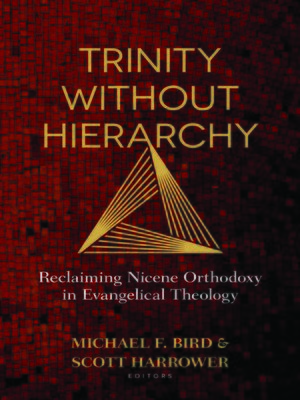Trinity Without Hierarchy
ebook ∣ Reclaiming Nicene Orthodoxy in Evangelical Theology
By Michael F. Bird

Sign up to save your library
With an OverDrive account, you can save your favorite libraries for at-a-glance information about availability. Find out more about OverDrive accounts.
Find this title in Libby, the library reading app by OverDrive.



Search for a digital library with this title
Title found at these libraries:
| Library Name | Distance |
|---|---|
| Loading... |
A defense of equality among the persons of the Trinity In response to those complementarian theologians who assert that the Son is eternally subordinate to the Father, the contributors to Trinity Without Hierarchy contend that this view misconstrues the orthodox doctrine of the Trinity and reduces the Son to a lower level of glory and majesty than the Father. Surveying Scripture, church history, and theology, sixteen contributors present a defense of the full and equal authority of all three members of the Trinity while critiquing approaches that border on semi-Arianism. In particular, the creedal confessions of Nicaea are upheld as the historical standard by which any proposed Trinitarian doctrine should be judged. While some contributors hold complementarian and others egalitarian viewpoints, all agree that Trinitarian relations are not a proper basis for understanding gender roles. Trinity Without Hierarchy is indispensable reading for anyone interested in the current debate over the relationship between Trinitarian theology and the roles of men and women.







